“Veni, Vidi, Vici.” (I came, I saw, I conquered.)
Like this phrase, I want to say that, Prof. Barry Allen came at ECNU philosophy department, delivered a series of lecture and conquered all of the Chinese students, International students, and teachers’ mind. Between May 20 to June 6, 2018, Professor Barry Allen, a member of the Royal Society of Canada, Distinguished university professor at McMaster University, Canada, visited the Philosophy Department, East China Normal University and presented a series of fascinating, commendable and extraordinary lectures on “Knowledge in Chinese Tradition”.
Prof. Allen presented his first lecture in the evening of 21st May. The day was rainy, the weather was cool, and with such romantic weather Prof. Allen started his hot lecture. He mainly focused on Confucian idea about knowledge知. Unlike another professor, he started his lecture in a different style. At first, he gave a short talk and then started the teaching way of Socrates style. One student raises a question and one by one he gives a perfect answer in discussion.
He raised a question: “What makes knowledge valuable?” Based on this question he was starting the idea of knowledge in Chinese tradition. In his view, Sage was a more important idea in ancient Chinese philosophy. He mentions wuwei無爲 as effortless efficiency. The idea of wuwei is very important in ancient Chinese philosophy, especially in Daoist philosophy.
He gave a short introduction to the question “What is knowledge? ” Most of the students only know that the dominant and popular defination of knowledge as justified true belief. But according to his view, this definition is like a straw man. Actually, he understood knowledge in a hybrid way. In this lecture he also mentioned the book of Great learning 大學,military works and so on.
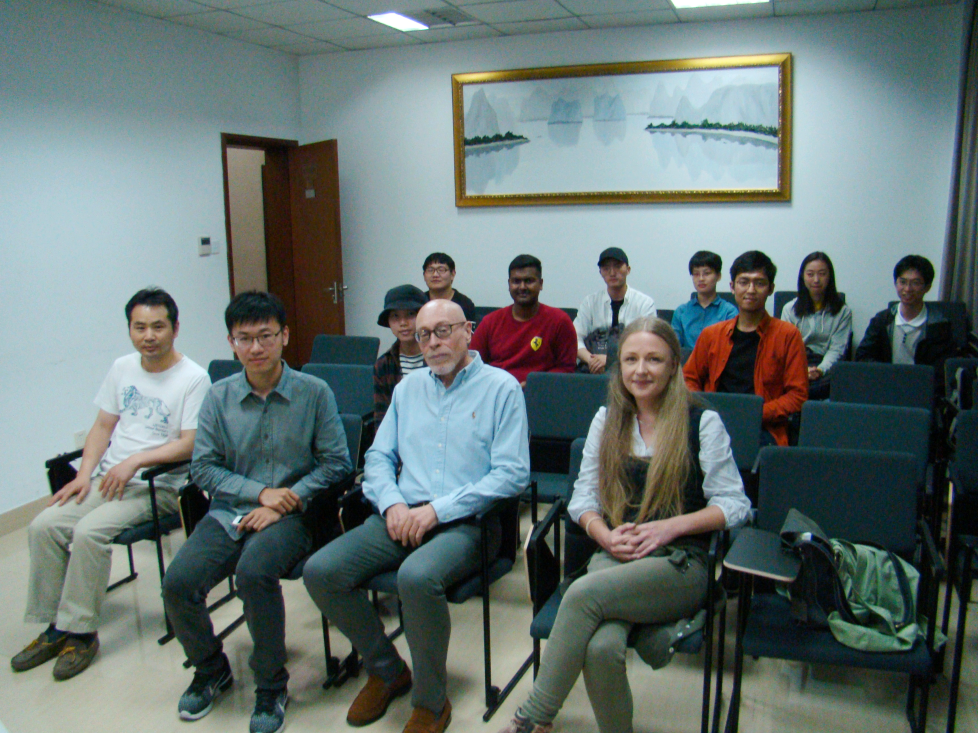
In his second lecture, he began with Daoist philosophy. As usual, he introduced us the basic conception of Daoist philosophy, what is Dao道?He gave a short but very strong definition of Dao. As he mentioned, Dao is like a wheel. He also said that Dao is pregnant emptiness and Dao is like flowing water. Then, he turned to Chapter 5, Daodejing道德經. He mentioned an interesting idea, Double-acting Bellows. He also discussed Chapter 40 and Chapter 52.
The second part of this lecture was based on Zhuangzi’s莊子 philosophy. He started Chapter 1, Zhuangzi and mentioned the story of fish and bird. He discussed “Little knowledge does not measure up to big knowledge” :
Great knowledge is effortless,
Petty knowledge picks holes,
A great speech is flavorless,
Petty speech strings words.
Discussing Chapter 3, Zhuangzi, he showed us the knowledge of sage and butcher in the story of a butcher. Later he went to Chapter 5 and raised a question: “What is so impressive about Sad Nag?” He explained this in two way. First is wholeness, explained as “complete potential” and second is a Formless virtue.
He also described two Greek terms in this discussion: Morphe: Shape, outline, figure; Eidos: idea, presence, fullness. Form is the actuality, reality or being of a being. Finally, he mentioned Chapter 20, Zhuangzi and ended this lecture with discussion.
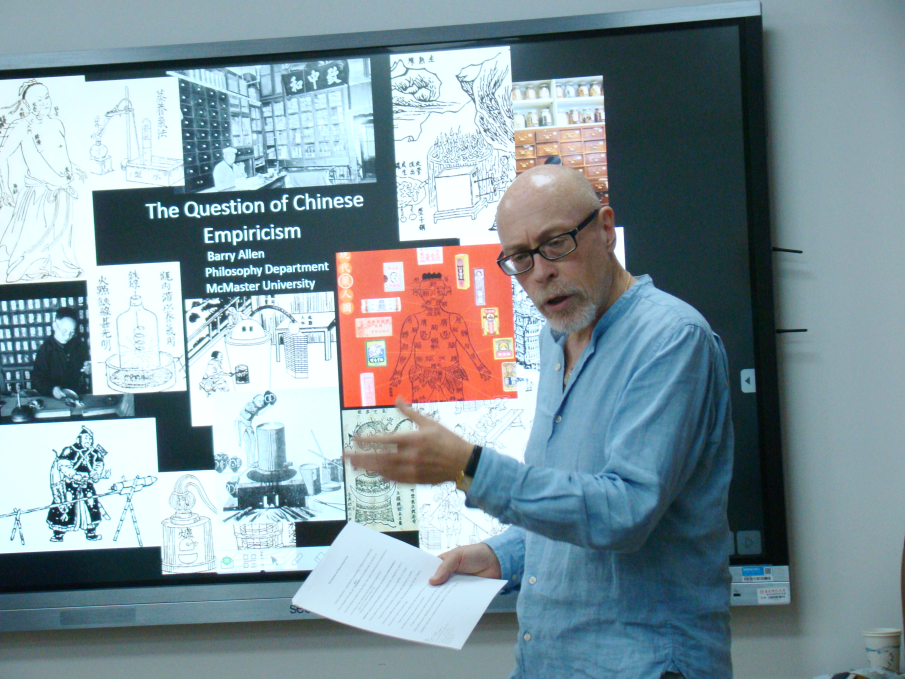
In the evening May 28, 2018 there was a symposium. Prof. Yang Guorong, Prof. Yu Zhenhua, Prof. Xu Zhu, Prof. Yu Feng, Prof. Liu Liangjian and Chinese and international students attended this symposium. At first, Prof. Yu presented his paper. His paper mainly discussed the Rorty- Allen debates on knowing how and knowing that. After his presentation, a long time all professors discussed the idea of knowledge, idea of pragmatism with Prof. Barry Allen. In a word, I want to say that, in that evening this room was “full of knowledge”, as well as something beyond knowledge.

After finished Confucianism and Daoism, he turned to military philosophy in his fourth lecture, discussing The Art of War, or Master Sun’s Military Methods. As he mentioned earlier, perhaps Sunzi’s Art of War is older than Laozi because in Daodejing we saw that, Laozi mentioned the idea of military philosophy. At first, Prof. Allen discussed the idea of knowledge in Art of War. In his book he talked about that, the essential discovery in the Art of war is that there can be an art of war.
“Victory is something that you can craft and bring into being” (SZ.6)
“The dao of war is deception (gui)” (SZ.1)
Prof. Allen mentioned 3 important key points in Sunzi’s Philosophy: Value of deception,Value of unorthodox (奇), and Emptiness. He mentioned a lot of quotes from Sunzi’s art of war and discussed his idea and knowledge. Later, he also mentioned some quotes from Daodejing and tried to show some relation and similarities with Art of War and finished his lecture with discussion.
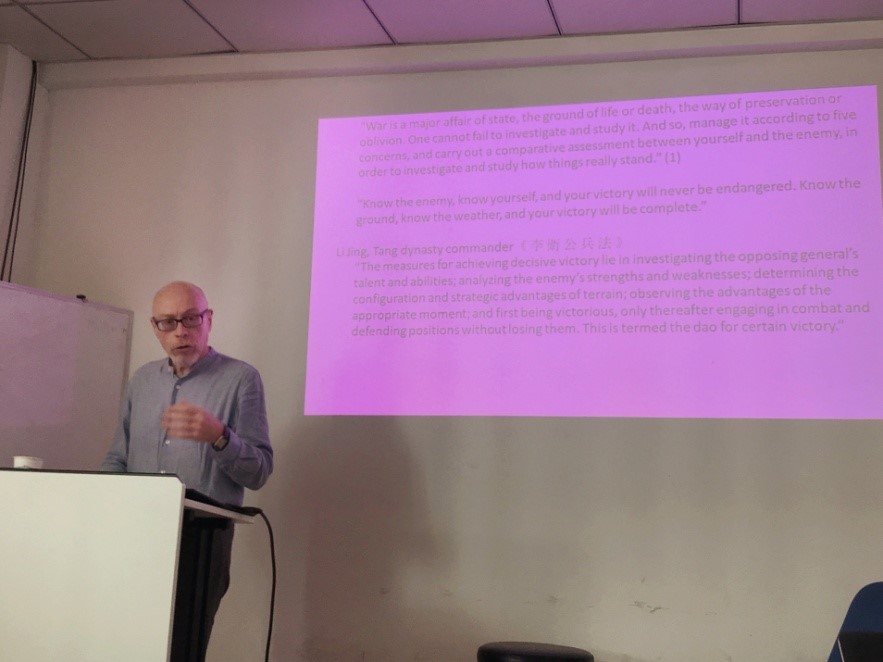
In his 5th Lecture, he discussed the investigation of things (gewu格物) in the Great Learning, Zhu Xi and Wang Yangming in the corridor of Hanfenlou Teahouse, with some mosquitoes flying around.

His 6th and last lecture was about Chan Buddhism.He mainly focused on the idea of emptiness 空/虚,he discussed the Daoist, Confucian and Buddhist idea about emptiness. He also mentioned a great Indian Buddhist philosopher Nagarjuna (150-250CE). His main concept in Buddhism was emptiness. Nagarjuna’s one of the famous quotes is:
“All possible when emptiness is possible
Nothing is possible when emptiness is impossible”
He also discussed the Chan Buddhism idea about life, their belief, doctrine, and practice in a comparative way. We learned a lot of new information from this lecture. In last time we were doing a long time discussion with him and took an international group picture after his lecture.
Last not not the least, I want to say that, we passed a great time with Prof. Barry Allen. His every lecture was helpful, energetic and full of knowledge. I feel really lucky and happy to be a part of these lectures.
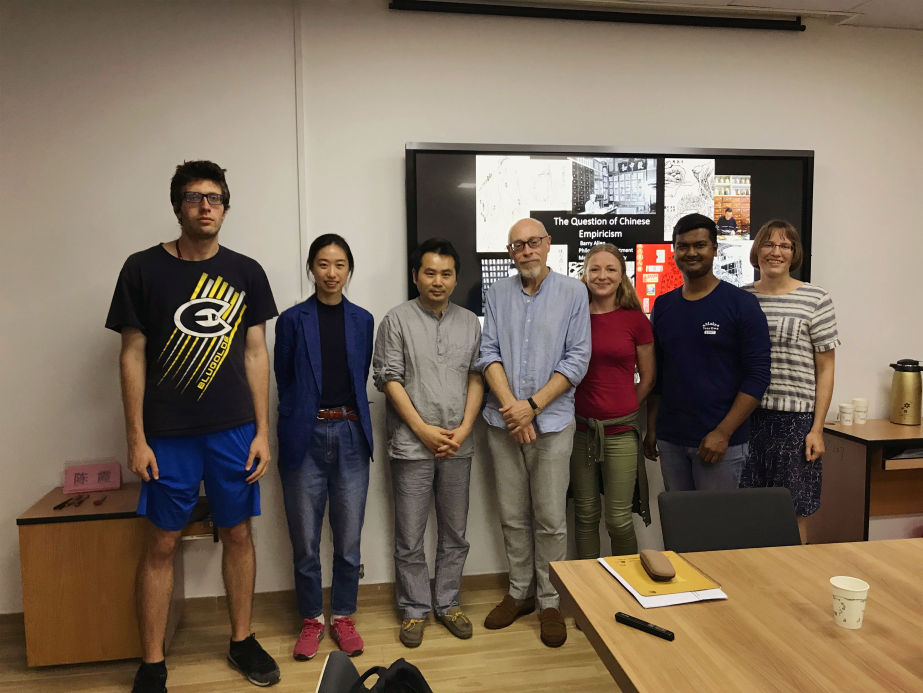
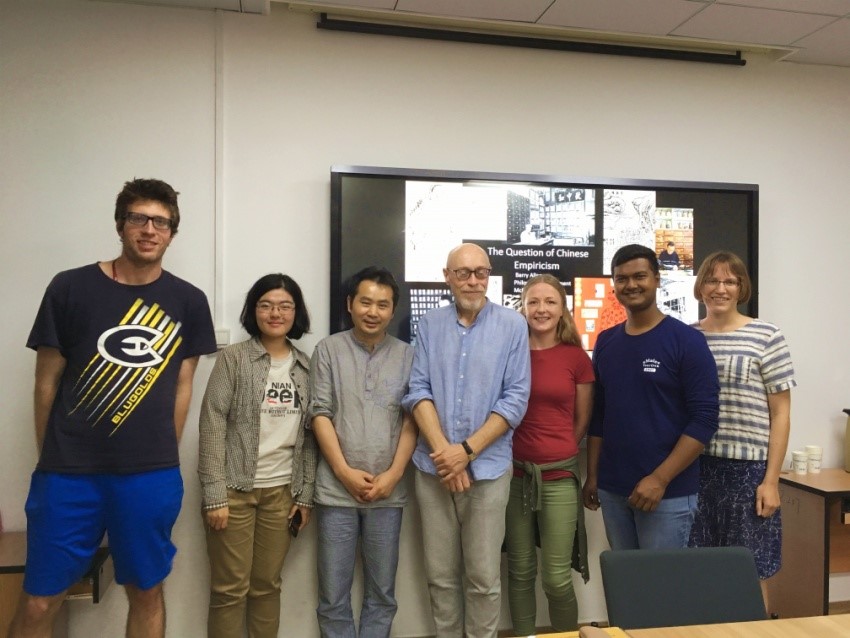
Hope to see you again at ECNU, Professor Barry Allen.
(Pritam Saha, International Program for Graduate Studies in Chinese Philosophy)